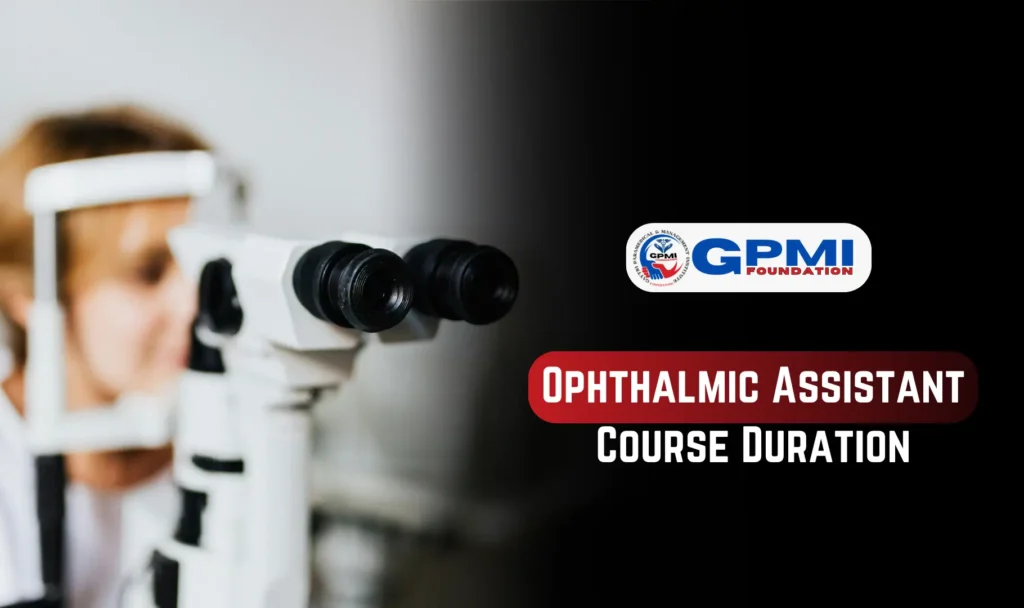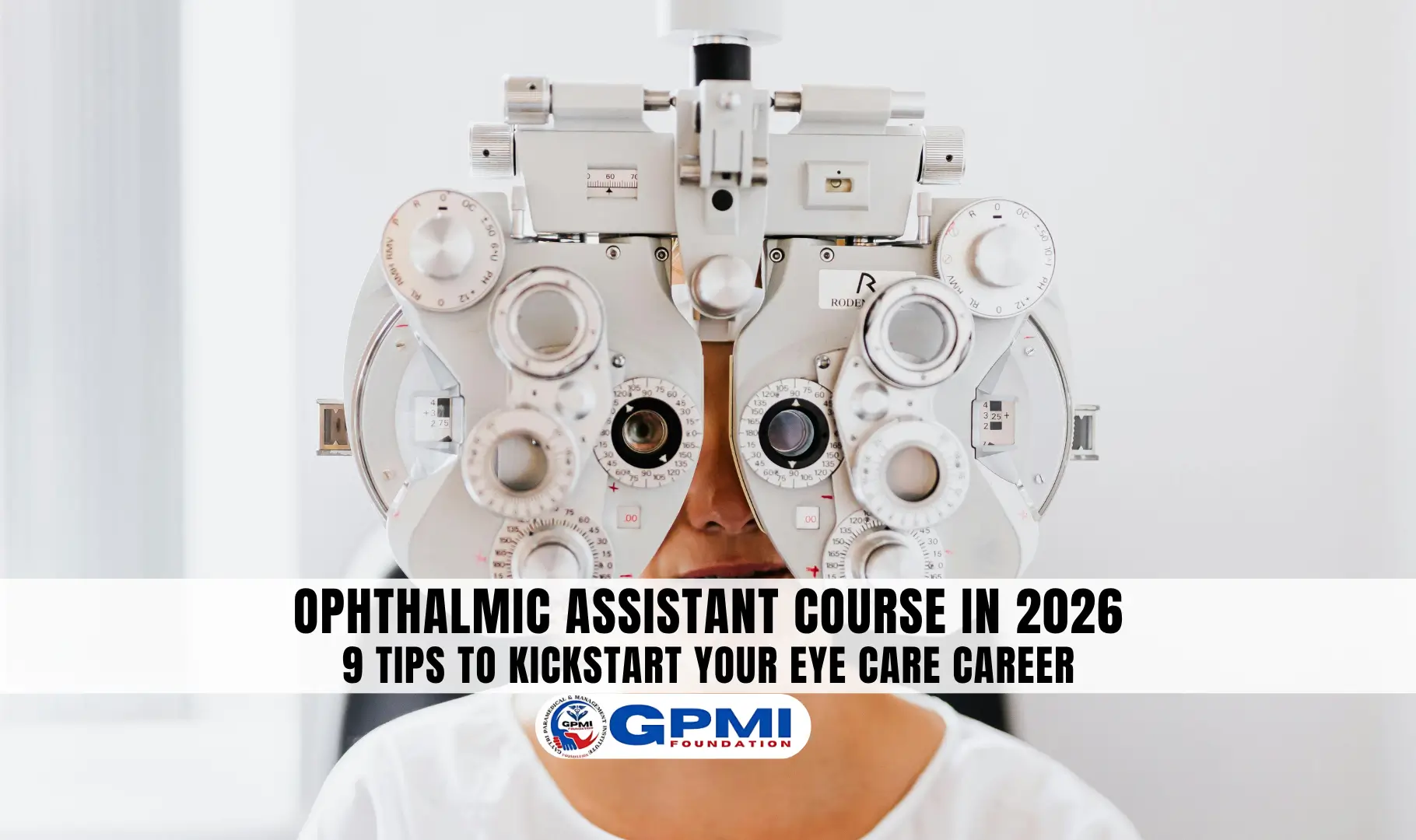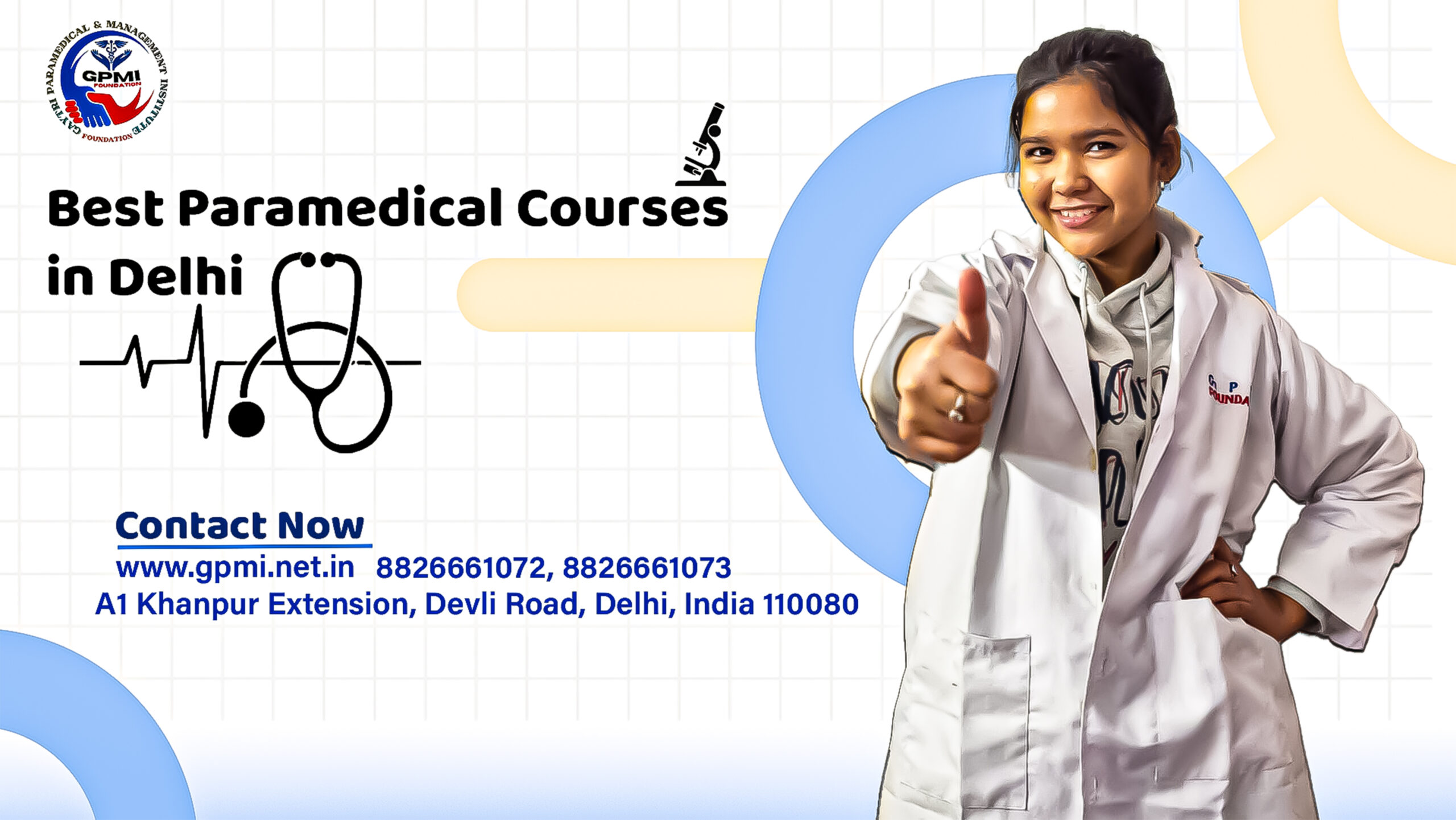Do you want a career in the medical field but are not sure where to start? An Ophthalmic Assistant Course could be a perfect choice. Ophthalmic assistants are trained professionals who help eye doctors (ophthalmologists) in hospitals and clinics. They assist with eye exams, check patients’ vision, and help in different eye treatments. Without skilled assistants, eye doctors cannot manage their daily work efficiently.
Eye health is very important for everyone. With more people facing eye problems like myopia, cataracts, and other vision issues, the demand for trained ophthalmic assistants is increasing every year. This makes it a promising career for students who are interested in healthcare but want to focus on eye care.
If you are finishing your 12th standard, 2026 is a great year to start this course. Many hospitals and eye clinics are now looking for skilled assistants. Completing this course will not only give you practical knowledge about eye care but also open the door to many career opportunities. You can work in hospitals, eye clinics, diagnostic centers, or even start your own practice later.
This course is easy to understand and designed for beginners. You will learn step by step how to assist doctors, use eye-care equipment, and handle patients in a professional way. By joining an ophthalmic assistant course, you are taking the first step toward a stable and respected career in the healthcare field.
So, if you are interested in helping people see better and want a career in healthcare, an ophthalmic assistant course is a smart choice for 2026. It is practical, in demand, and gives you the skills needed to succeed in the growing field of eye care.
Table of Contents
What is an Ophthalmic Assistant Course?
An Ophthalmic Assistant Course is a training program designed to teach students how to assist eye doctors and care for patients with vision problems. This course is perfect for students who have completed their 12th standard and want to start a career in the medical field, especially in eye care.
In this course, you will learn about the human eye, different eye diseases, and how to perform basic eye examinations. You will also get training on using medical equipment like slit lamps, tonometers, and vision charts, which are essential tools for checking eye health. Along with practical skills, the course also teaches theoretical knowledge so that you understand how the eye works and how to help patients properly.
Most ophthalmic assistant courses take 6 months to 1 year to complete, depending on the institute. Some courses are offered online, while others are classroom-based with hands-on training. Many institutes also provide internships in hospitals or eye clinics, which help students gain real-life experience.
After completing this course, students can start working in hospitals, eye clinics, diagnostic centers, or optician stores. They can assist doctors in eye surgeries, help patients with eye exams, and maintain medical records. This course is not only a stepping stone for a career in eye care but also prepares students for advanced studies in ophthalmology if they wish to continue their education.
In simple words, an ophthalmic assistant course gives you the skills, knowledge, and confidence to work in the growing field of eye care. It is practical, easy to learn, and very useful for anyone interested in helping people see better.
Course Details of Ophthalmic Assistant Course
The Ophthalmic Assistant Course is designed for students who want to start a career in eye care and healthcare after completing 12th. This course trains you to assist eye doctors (ophthalmologists) in hospitals, clinics, and diagnostic centers. It focuses on both practical and theoretical knowledge, helping you become confident in handling patients and using eye-care equipment.
In this course, you will learn about the structure of the human eye, common eye problems, and how to check vision. You will also get hands-on training with tools like slit lamps, tonometers, and vision charts. Along with medical knowledge, the course teaches you how to interact with patients, take their medical history, and assist doctors during eye exams and minor procedures.
The course is beginner-friendly and does not require any prior medical experience. Most institutes offer guidance step by step, so even if you are new to healthcare, you can easily understand and practice the skills. Many courses also include internships or practical training in hospitals or eye clinics, which gives you real-world experience before starting your career.
Completing this course opens up multiple career options. You can work in hospitals, private clinics, optician stores, or diagnostic centers. Some students choose to continue their studies in optometry or advanced ophthalmology courses to grow further in this field.
Overall, the ophthalmic assistant course is short, practical, and highly useful. It equips you with the skills, confidence, and knowledge needed to start a stable and respected career in eye care. For students completing 12th in 2026, it is an excellent way to enter the healthcare field and make a meaningful difference in people’s lives.
Eligibility Criteria: Who Can Join
The Ophthalmic Assistant Course is open to students who have completed their 12th standard. Most institutes prefer students from the Science stream (Physics, Chemistry, Biology), but some institutes also allow students from other streams if they are interested in healthcare.
Age criteria may vary depending on the institute, but generally, students between 17 to 30 years can apply. There is no need for prior medical knowledge or experience, as the course is designed for beginners.
Some institutes may require a minimum passing percentage in 12th, usually around 50–60%. Admission can be based on merit, direct enrollment, or entrance exams depending on the institute. Students should have a basic understanding of English, as most course materials and practical instructions are in English.
This course is ideal for students who want to start a career in healthcare quickly after 12th. It provides the knowledge and practical skills needed to work as an ophthalmic assistant in hospitals, clinics, or diagnostic centers.
In short, if you have completed 12th, are motivated, and interested in eye care, you can easily join this course. It is beginner-friendly, requires no previous medical experience, and opens doors to a stable and respected career in the healthcare field.
Ophthalmic Assistant Course Duration

The Ophthalmic Assistant Course is designed to be short and practical, so students can start their careers quickly after completing 12th. The duration of the course usually ranges from 6 months to 1 year, depending on the institute and the type of program you choose. Some institutes offer full-time classroom courses, while others provide part-time or online courses for students who cannot attend regular classes.
During this period, you will learn both theoretical and practical aspects of eye care. Theoretical lessons include understanding the human eye, common eye diseases, eye anatomy, and basic healthcare knowledge. Practical training allows you to work directly with ophthalmic equipment such as slit lamps, tonometers, and vision charts. Many institutes also include internships or hands-on practice in hospitals and clinics, which help students gain real-world experience and confidence before starting their careers.
The course is structured to provide step-by-step learning, so even students with no prior medical knowledge can understand and perform tasks efficiently. Some institutes divide the program into modules, starting with basic theory, moving to practical sessions, and finally giving exposure to real patients during internships.
Completing the course in 6 to 12 months is enough to start working professionally as an ophthalmic assistant. Short duration, combined with practical experience, makes this course a great choice for students who want a fast-track career in healthcare. By the end of the course, you will have the knowledge, skills, and confidence to assist doctors, handle patients, and begin a rewarding career in the field of eye care.
Syllabus of Ophthalmic Assistant Course
The Ophthalmic Assistant Course syllabus is designed to give students both theoretical knowledge and practical skills needed to work in eye care. It is simple and easy to understand, even for beginners who have just completed 12th.
In the theory part, students learn about the structure and function of the human eye, common eye diseases like cataracts, glaucoma, and myopia, and basic eye care practices. You also study medical terminology, patient care, and record-keeping, which help you understand how hospitals and clinics operate.
The practical part is very important. Students get hands-on training with eye examination tools such as slit lamps, tonometers, vision charts, and lenses. You will learn how to check vision, assist during eye procedures, and handle patients safely. Many institutes also include internship sessions in hospitals or eye clinics, where students gain real-life experience under the guidance of experienced doctors.
Some courses divide the syllabus into modules, starting with basic theory, then practical training, and finally patient interaction. This step-by-step approach helps students become confident and skilled.
By the end of the course, you will have a complete understanding of eye care, practical experience with equipment, and the ability to assist doctors professionally. This syllabus prepares you for a stable and successful career in eye care.
9 Tips to Kickstart Your Eye Care Career

1. Understand the Course Structure
Before joining, know what you will learn. Most courses teach about the human eye, common eye problems, and how to assist doctors. There is usually a mix of theory and practical training. Knowing the structure helps you plan your studies better.
2. Choose the Right Institute
Pick a good institute that is recognized and has experienced teachers. Check if they have labs and equipment for hands-on learning. A good institute gives you better knowledge and better job opportunities.
3. Focus on Practical Skills
Practicing is very important. You will learn to check vision, measure eye pressure, and help during exams. The more you practice, the more confident you become in handling patients and equipment.
4. Get Familiar with Ophthalmic Equipment
Learn to use tools like slit lamps, tonometers, and vision charts. These are essential for eye exams. Knowing the equipment well makes your work easier and faster.
5. Develop Soft Skills
Being polite and helpful is important. You will meet patients of all ages. Good communication and patience help patients feel comfortable and trust you.
6. Gain Internship Experience
Many courses offer internships in hospitals or eye clinics. This real-life experience is very valuable. You will learn how clinics work and how to assist doctors professionally.
7. Prepare for Certification Exams
Some courses have exams to give you a certificate. Prepare well and revise your lessons. A certificate increases your credibility and improves job chances.
8. Explore Career Opportunities
After completing the course, you can work in hospitals, eye clinics, diagnostic centers, or optician stores. Some students even choose to continue studies in ophthalmology for advanced roles.
9. Keep Learning and Upskilling
Eye care is always improving. Attend workshops, online courses, and training programs to learn new techniques. Upskilling helps you stay ahead and grow in your career.
Practical Training and Internships
One of the most important parts of the Ophthalmic Assistant Course is practical training and internships. While theoretical knowledge teaches you about the human eye and common eye diseases, practical experience helps you apply that knowledge in real life.
During the course, students get hands-on training with essential eye-care equipment like slit lamps, tonometers, vision charts, and lenses. You will learn how to check vision, measure eye pressure, assist during eye examinations, and handle patients safely. This hands-on practice is important because it builds confidence and skill, which are necessary to work in hospitals or clinics.
Many institutes also provide internship opportunities in hospitals, eye clinics, or diagnostic centers. During these internships, you will work under the guidance of experienced ophthalmologists and technicians. You will get to see real patients, observe treatments, and assist doctors in their daily tasks. This experience is very valuable because it helps you understand how clinics operate, how to manage patients professionally, and what the daily routine of an ophthalmic assistant looks like.
Practical training and internships make the course complete and job-ready. By the end of your training, you will not only have theoretical knowledge but also the skills, experience, and confidence needed to start a career as an ophthalmic assistant. This hands-on approach ensures that you are prepared for real-world work immediately after completing the course.
Ophthalmic Assistant Course Career Scope & Salary in 2026

After completing an Ophthalmic Assistant Course, there are many career opportunities waiting for you in 2026. Hospitals, eye clinics, diagnostic centers, and optician stores all need trained assistants to help doctors and patients. With more people paying attention to eye health, the demand for skilled ophthalmic assistants is growing every year.
You can start your career as an Ophthalmic Assistant or Eye Care Technician. With experience, you can move to higher positions like Senior Assistant or Clinic Supervisor. Some assistants also choose to specialize further by studying advanced ophthalmology courses, which can open doors to better jobs and higher salaries.
The salary of an ophthalmic assistant depends on your experience and workplace. Freshers can expect ₹12,000 to ₹18,000 per month in small clinics, while experienced assistants in big hospitals can earn ₹25,000 to ₹40,000 per month. If you work in private clinics or start your own practice, the income can be even higher.
Besides salary, this career gives you job security and a chance to make a difference in people’s lives. You will gain practical experience, meet different patients, and become an important part of the healthcare team.
In 2026, pursuing an ophthalmic assistant course after 12th is not just about a job. It is about starting a stable, respected, and meaningful career in the growing field of eye care. With dedication, practice, and continuous learning, you can achieve success and enjoy a bright future in this profession.
Frequently Asked Questions (FAQ)
Q1: What is an Ophthalmic Assistant?
An Ophthalmic Assistant is a trained professional who helps eye doctors in hospitals, clinics, and diagnostic centers. They assist in eye examinations, patient care, and using ophthalmic equipment.
Q2: Who can join an Ophthalmic Assistant Course?
Students who have completed 12th standard can join the course. Most institutes prefer science students, but some also accept students from other streams. No prior medical knowledge is required.
Q3: How long does it take to become an Ophthalmic Assistant?
The course usually takes 6 months to 1 year to complete. Some institutes offer online options, while others provide classroom-based learning with hands-on training.
Q4: What jobs are available for an Ophthalmic Assistant?
After completing the course, you can work as an Ophthalmic Assistant in hospitals, eye clinics, diagnostic centers, optician stores, or even start your own practice in the future.
Q5: What skills does an Ophthalmic Assistant learn?
An Ophthalmic Assistant learns eye examination techniques, patient handling, using ophthalmic equipment, record-keeping, and basic knowledge of eye diseases.
Q6: Is there a good career scope for an Ophthalmic Assistant?
Yes! The demand for trained Ophthalmic Assistants is increasing in 2026 and beyond. With experience, you can earn a good salary and grow into senior roles or advanced ophthalmology studies.
Conclusion
An Ophthalmic Assistant Course is a smart choice for students who have completed 12th and want a career in healthcare. This course teaches you practical skills, eye care knowledge, and patient-handling techniques that are very useful in hospitals and clinics.
In 2026, the demand for trained ophthalmic assistants is increasing. By completing this course, you can start a stable career, earn a good salary, and grow in the medical field. It is a course that is easy to learn, in demand, and opens doors to many opportunities in eye care.
If you are interested in helping people see better and want a respected career in healthcare, joining an ophthalmic assistant course is the right step. With dedication, practice, and continuous learning, you can build a successful and rewarding career in eye care.






